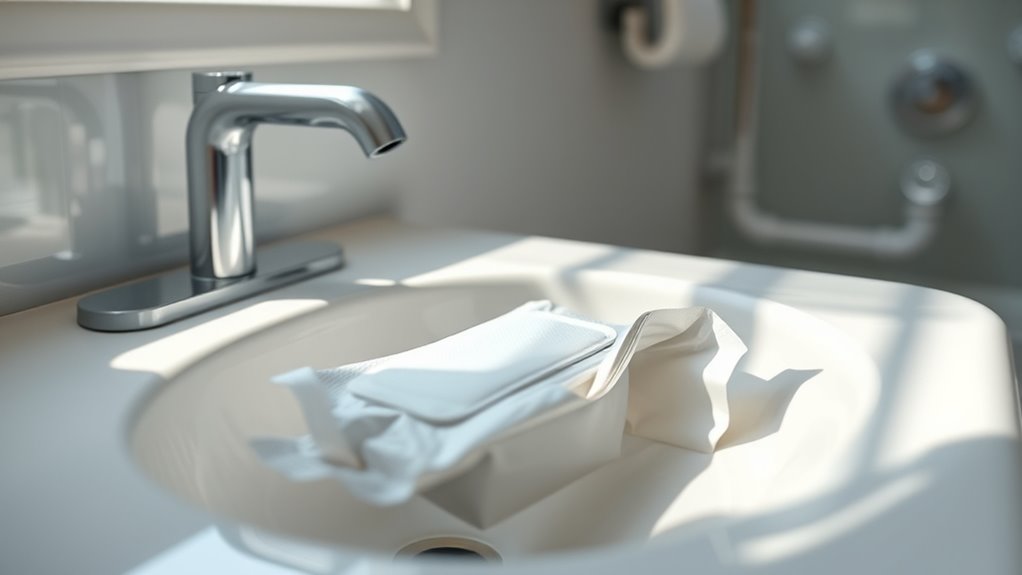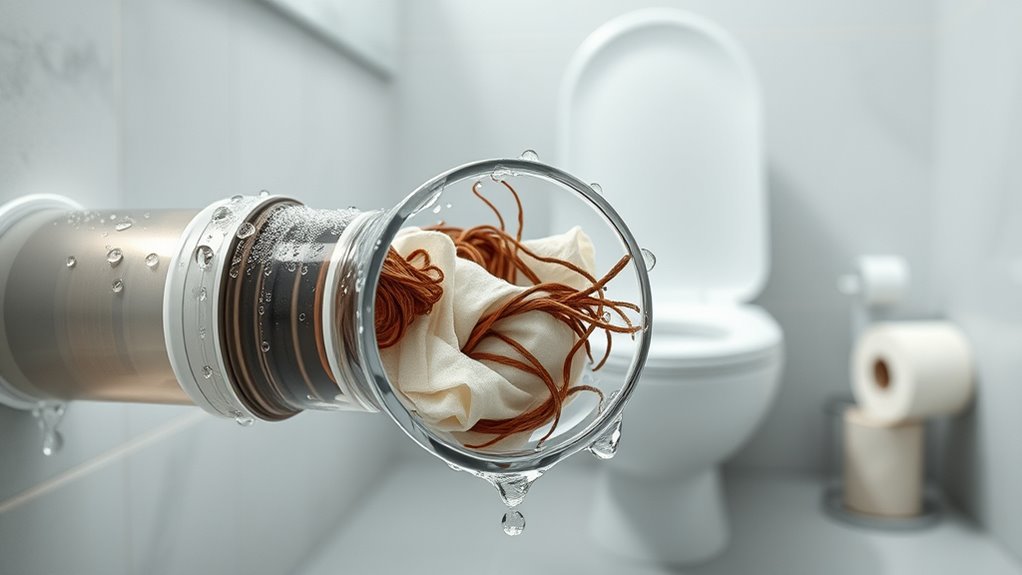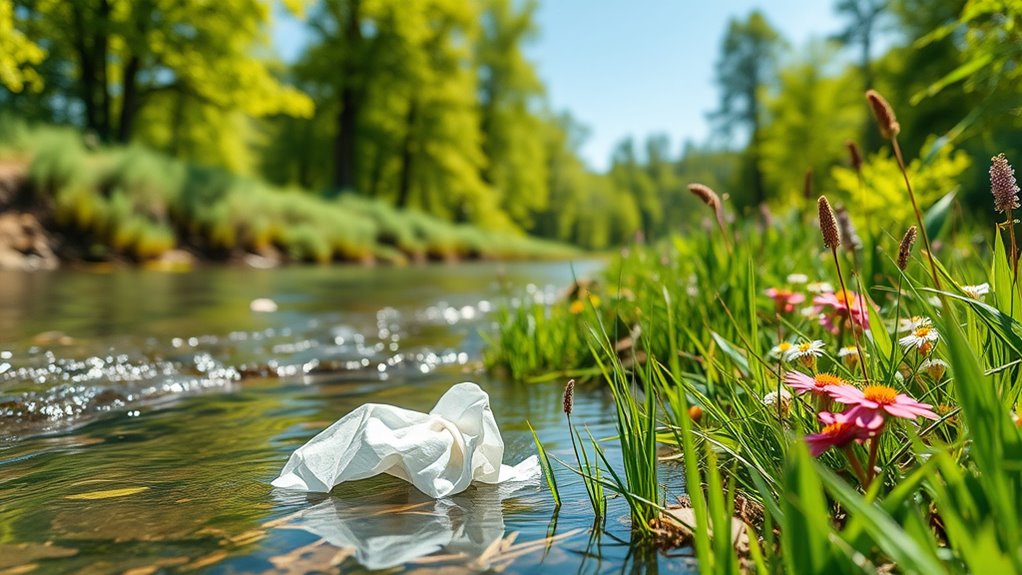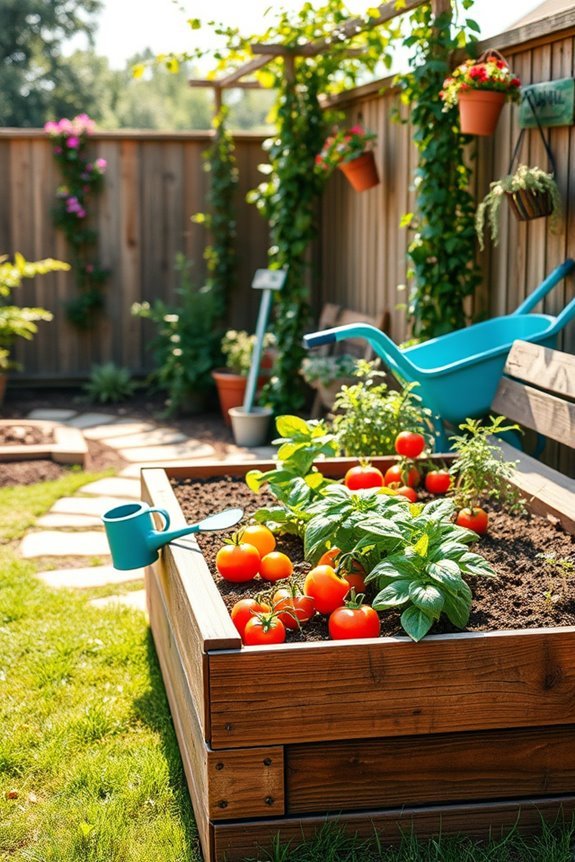Do Flushable Wipes Clog Pipes? Risks, Evidence, and Safer Alternatives
Flushable wipes can clog pipes because they are made of synthetic fibers that do not break down like regular toilet paper. This can lead to plumbing issues and expensive repairs, especially when mixed with hair, grease, or other debris. Despite their “flushable” labeling, many brands do not dissolve properly. To avoid these problems, consider using biodegradable alternatives and ensure proper disposal methods to maintain plumbing health.
Understanding Flushable Wipes

Flushable wipes are increasingly popular for their softness and moisture, offering an alternative to traditional toilet paper. They are especially favored by families with young children or those with specific hygiene needs.
However, it’s crucial to understand that despite being labeled “flushable,” these wipes can cause plumbing issues. Unlike toilet paper, which disintegrates in water, flushable wipes often hold their structure, leading to potential blockages in pipes.
If you are considering using flushable wipes, be aware of the following:
- Plumbing Risks: Many plumbing systems are not designed to handle flushable wipes, which can lead to costly repairs.
- Environmental Impact: Many wipes do not biodegrade as claimed, complicating waste management and harming the environment.
To avoid plumbing issues and environmental harm, consider disposing of wipes in the trash instead of flushing them down the toilet. This simple change can help prevent blockages and promote better waste management.
The Composition of Flushable Wipes
Flushable wipes may seem convenient, but their true flushability is often questionable. Made from synthetic fibers like polyester and polypropylene, these wipes are thicker and more durable than regular toilet paper.
While some brands claim their wipes break down in water, studies show many do not disintegrate properly, risking plumbing problems.
Additionally, flushable wipes can contain chemicals, preservatives, and fragrances, complicating disposal and posing threats to household and municipal waste systems.
Before flushing, consider the potential environmental impact and safety concerns associated with these products.
How Flushable Wipes Differ From Toilet Paper
Flushable wipes and toilet paper are fundamentally different in their materials and how they break down in water.
Toilet paper is specifically designed to dissolve quickly, making it safe for sewage systems. In contrast, flushable wipes often contain synthetic fibers that do not break down easily, leading to potential plumbing issues.
It’s important to remember that even if a product is labeled as “flushable,” it may not be safe for your plumbing. For optimal plumbing health, stick to using toilet paper for flushing.
Material Composition Differences
When it comes to personal hygiene, understanding the differences in material composition between flushable wipes and toilet paper is crucial for proper disposal and environmental impact.
Toilet paper is made from biodegradable paper pulp, allowing it to disintegrate quickly in water. This makes it safe for plumbing systems.
On the other hand, flushable wipes are typically made from a mix of synthetic fibers, like polyester or polypropylene, combined with some natural materials. While these synthetic fibers improve durability and moisture retention, they significantly hinder biodegradability. As a result, flushable wipes do not break down easily and can cause plumbing clogs.
For consumers concerned about disposal and environmental effects, choosing biodegradable toilet paper over flushable wipes is the safer option.
Disintegration Rates Compared
When choosing between flushable wipes and toilet paper, it’s essential to understand their disintegration rates.
Toilet paper is designed to break down quickly in water, typically within minutes, which helps prevent plumbing issues.
In contrast, many flushable wipes, despite their claims, often contain synthetic fibers that can take hours or even days to disintegrate.
This significant difference can lead to clogged pipes and sewage systems.
To avoid plumbing complications, it’s crucial to select products that disintegrate efficiently, with toilet paper being the safer choice for disposal.
The Science Behind Clogs

Understanding Clogs: Causes and Prevention
Clogs can lead to significant plumbing issues, but knowing their causes can help you prevent them. Here’s a quick overview:
- Material Composition: Hair, grease, and non-biodegradable items are common culprits that lead to clogs.
- Water Flow Dynamics: Fluctuations in water pressure or flow can worsen debris accumulation.
- Pipe Condition: Damaged or corroded pipes with rough surfaces can trap particles more easily.
- Environmental Factors: Temperature and humidity can affect how quickly organic materials degrade, influencing clog formation.
Evidence of Pipe Clogging From Flushable Wipes
Flushable wipes may seem convenient, but numerous studies reveal they can cause serious plumbing problems.
Unlike toilet paper, these wipes do not break down properly in wastewater systems, leading to clogs. Their fibrous materials can combine with grease and other debris in pipes, creating stubborn blockages.
Many plumbing professionals have reported an increase in service calls for these wipe-related issues, indicating a clear link between flushable wipes and plumbing troubles.
Wastewater treatment facilities also face challenges due to these wipes, which complicate operations.
To avoid costly plumbing repairs and treatment plant issues, it’s advisable to avoid flushing wipes and opt for proper disposal methods instead.
Case Studies of Plumbing Issues
Flushable wipes are a major contributor to plumbing issues in many municipalities, causing strain on sewage systems and leading to expensive repairs.
These real-life case studies demonstrate the negative impact of improper disposal practices on public infrastructure.
If you’re looking for solutions to avoid plumbing problems, consider disposing of wipes in the trash instead of flushing them.
This simple change can save your community from costly maintenance challenges.
Real-Life Plumbing Incidents
Flushable wipes can lead to serious plumbing issues in homes and businesses, often resulting in costly repairs.
If you’re considering using these products, it’s important to be aware of the potential problems they can cause:
- A family faced $3,000 in plumbing repairs due to wipes clogging their main sewer line.
- A restaurant had to shut down for a week because of plumbing issues linked to flushable wipes.
- Homeowners found their septic system failing after regular use of these wipes.
- An apartment complex replaced multiple pipes due to repeated backups caused by wipes.
Given these risks, it’s wise to explore safer alternatives for sanitation to avoid plumbing disasters.
Municipal System Challenges
Flushable wipes can lead to significant issues for municipal sewage systems. Many cities, like San Francisco, experience costly blockages in sewer lines due to these products.
This not only results in expensive maintenance and repairs but can also cause overflows and environmental hazards. Wastewater treatment facilities often need special equipment to clear these clogs, further increasing operational costs.
To combat this, some municipalities have launched campaigns to educate the public on proper waste disposal, urging citizens not to flush wipes. This highlights the need for safer alternatives and better waste management practices in urban areas.
Environmental Impact of Flushable Wipes

Many households use flushable wipes for personal hygiene, but these products can have serious environmental consequences. Here are key points to consider:
- Decomposition Time: Flushable wipes can take years to break down, contributing to landfill waste.
- Resource Use: Their production often involves non-renewable resources, which impacts sustainability.
- Water Contamination: Improper disposal can lead to pollution in waterways.
- Microplastics: Wipes may release microplastics, which can enter the food chain and harm wildlife.
As awareness of these issues grows, more consumers are seeking eco-friendly alternatives.
Manufacturers are responding by exploring sustainable materials and production methods to reduce the environmental impact of flushable wipes.
If you’re looking for better options for personal hygiene that are kinder to the planet, consider these alternatives.
The Misleading Term “Flushable”
When you see the term “flushable,” it’s important to understand that it doesn’t necessarily mean safe for your plumbing.
Many products labeled as flushable only indicate that they can pass through toilets, not that they will break down in sewer systems. In fact, flushable wipes can lead to serious plumbing issues, including blockages.
Unlike toilet paper, which disintegrates quickly, many flushable wipes are made from synthetic materials that do not decompose easily.
To avoid potential plumbing problems, it’s best to reconsider using items labeled as flushable. Opting for truly biodegradable products can help protect your plumbing and municipal systems.
Plumbing Experts Weigh In
Plumbing experts caution against using flushable wipes due to their potential to cause serious clogs in drainage systems.
Despite being marketed as safe for flushing, these wipes do not break down as promised, leading to costly plumbing issues.
To maintain your plumbing, it’s best to avoid flushing these products and opt for alternatives that are truly biodegradable.
Expert Opinions on Wipes
Flushable wipes, often labeled as safe for sewer systems, can significantly impact plumbing infrastructure.
Plumbing experts warn that these wipes do not break down as quickly or easily as toilet paper, leading to potential clogs and costly repairs. Here’s what you need to know:
- Blockages: Flushable wipes can accumulate in pipes, creating blockages.
- Disintegration Time: They require more water and time to disintegrate compared to traditional toilet paper.
- Increased Costs: Homeowners and municipalities may face higher maintenance costs due to these clogs.
- Safer Alternatives: For a safer disposal option, consider using regular toilet paper or biodegradable wipes.
Understanding these factors can help you make informed decisions about what to flush.
Common Clogging Issues
Common clogging issues in plumbing often arise from the misuse of flushable wipes and other non-biodegradable products. Unlike toilet paper, these items do not break down, leading to blockages that can result in costly repairs and plumbing emergencies.
| Clogging Cause | Consequences |
|---|---|
| Flushable Wipes | Frequent plumbing backups |
| Hair and Grease | Slow drains and unpleasant odors |
| Food Waste | Sewer line blockages |
| Feminine Hygiene Products | Increased repair costs |
To prevent these issues, homeowners should only dispose of toilet paper in their toilets. Being mindful of what goes down the drain can help maintain plumbing systems and save on maintenance expenses.
Cost Implications of Clogged Pipes
Clogged pipes can lead to significant costs for homeowners and businesses. Here’s a breakdown of the financial implications:
- Emergency Plumbing Services: Unexpected clogs can require urgent professional help, leading to high service fees.
- Repair and Replacement Costs: Ongoing clogs may damage pipes, resulting in costly repairs or replacements.
- Water Damage: Clogs can cause leaks, leading to structural damage and expensive repairs.
- Increased Utility Bills: Poor drainage can cause higher water bills as systems struggle to manage waste.
To avoid these costs, consider taking preventative measures against clogs from flushable wipes and similar products.
Alternatives to Flushable Wipes
As concerns about the environmental impact of flushable wipes increase, many people are seeking effective alternatives. Here are some options to consider:
- Biodegradable Wipes: These wipes break down more easily in the environment than traditional wipes, making them a better choice for plumbing systems.
- Reusable Cloths: Soft, washable cloths can be used for personal hygiene and cleaning. They can be laundered and reused, reducing waste.
- Natural Cleaning Solutions: Consider using water and natural ingredients like vinegar or essential oils for cleaning. These alternatives are effective and eco-friendly.
Biodegradable Wipes Options
If you’re looking for an environmentally friendly alternative to traditional wipes, biodegradable wipes are a great option. They break down more easily in landfills or composting systems, minimizing their environmental impact.
Here are some key benefits:
- Made from renewable, plant-based resources
- Naturally decompose over time
- Free from harmful chemicals
- Often packaged in eco-friendly materials
Switching to biodegradable wipes is a simple way to reduce your environmental footprint while maintaining convenience.
Reusable Cloth Alternatives
Many individuals are seeking sustainable cleaning solutions due to the environmental impact of flushable wipes.
Reusable cloth alternatives, made from soft materials like cotton or bamboo, offer an eco-friendly option for personal hygiene and household tasks. These cloths can be washed and reused multiple times, significantly reducing waste.
They are also customizable in size and design, catering to personal preferences. Over time, they can be more cost-effective than disposable products, as they eliminate the need for frequent purchases.
Natural Cleaning Solutions
Are you looking for natural alternatives to flushable wipes? Here are some effective eco-friendly cleaning solutions that can help you maintain a clean and healthy home:
- Vinegar: This natural disinfectant not only eliminates odors but also effectively cuts through grime.
- Baking Soda: Use it as a gentle abrasive and deodorizer for cleaning various surfaces.
- Essential Oils: These oils offer antibacterial properties and add pleasant scents, enhancing your cleaning routine.
- Olive Oil: Perfect for polishing and conditioning wood surfaces without harsh chemicals.
These ingredients are safe for your plumbing and contribute to a healthier living environment.
Best Practices for Safe Disposal
Proper disposal of flushable wipes is crucial for preventing plumbing problems and protecting the environment. Despite being labeled as flushable, these wipes often cause severe blockages in sewage systems. To mitigate these issues, here are recommended disposal methods:
| Recommended Disposal Method | Reason |
|---|---|
| Trash Bin | Reduces plumbing blockages |
| Biodegradable Alternatives | Minimizes environmental impact |
| Public Restroom Waste Bins | Ensures proper disposal |
| Educate Others | Increases community awareness |
Disposing of wipes in the trash is the best practice for maintaining plumbing systems and safeguarding the environment.
Consumer Awareness and Education
Flushable wipes are often misunderstood, leading to plumbing issues for many households and municipalities. Here’s what you need to know to stay informed:
- Flushability Misconceptions: Just because a product is labeled “flushable” doesn’t mean it breaks down easily in plumbing. Many don’t disintegrate, causing clogs.
- Environmental Impact: Disposing of wipes in toilets can lead to pollution and higher sewage treatment costs.
- Safer Alternatives: Consider using biodegradable wipes instead. They break down more easily and are better for the environment.
- Proper Disposal: Always dispose of wipes in the trash, not the toilet, to avoid potential plumbing problems.
Regulatory Perspectives on Flushable Products
As the popularity of flushable wipes grows, it’s important for consumers to understand the regulatory landscape surrounding these products.
Key agencies like the U.S. Environmental Protection Agency (EPA) and the Federal Trade Commission (FTC) stress the importance of accurate labeling to help consumers make informed disposal choices.
However, regulations vary significantly by region, leading to confusion and potential environmental concerns, especially regarding wastewater treatment systems.
To address these issues, there are calls for stricter guidelines and better collaboration among stakeholders.
This effort aims to promote responsible manufacturing and enhance consumer education about the proper use and disposal of flushable products.
Future of Flushable Wipes in Plumbing Systems
The future of flushable wipes in plumbing systems is uncertain due to several factors. Here’s what you need to know:
- Consumer Education: It’s crucial for users to understand the proper disposal methods for wipes to prevent plumbing issues.
- Regulatory Changes: Expect stricter guidelines for manufacturers to ensure wipes genuinely break down in water.
- Sustainability Focus: Eco-friendly alternatives are gaining traction, which may shift consumer preferences toward more sustainable options.
- Economic Impact: The costs associated with plumbing repairs and waste management will likely influence future production and innovation in this space.
Ultimately, the industry must find a balance between convenience and maintaining plumbing system integrity to determine the future role of flushable wipes.
Conclusion
Flushable wipes may seem convenient, but they can lead to plumbing issues, including clogs and costly repairs. Instead of using these wipes, consider safer alternatives like biodegradable wipes or toilet paper to avoid potential plumbing problems. Being aware of the risks associated with flushable wipes can help you make informed choices and maintain your plumbing system effectively.


